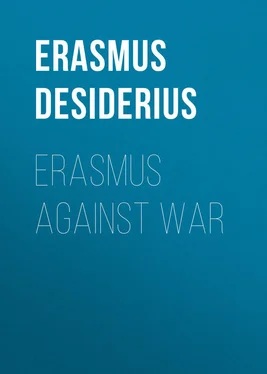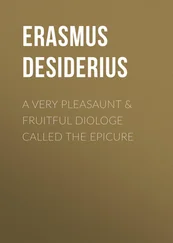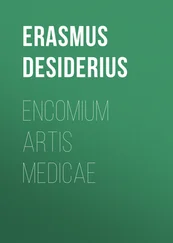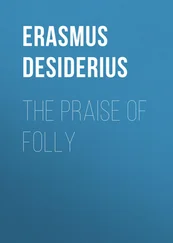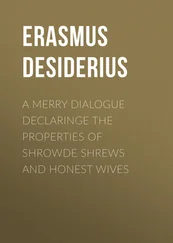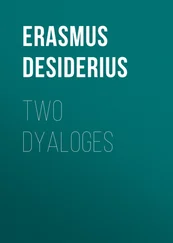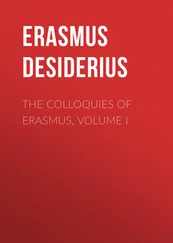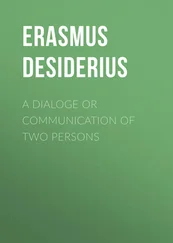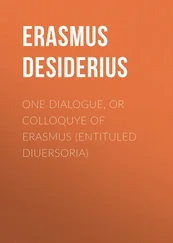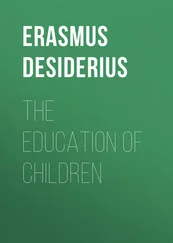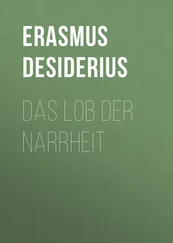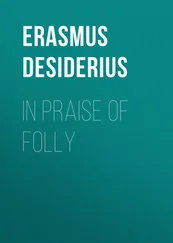Desiderius Erasmus - Erasmus Against War
Здесь есть возможность читать онлайн «Desiderius Erasmus - Erasmus Against War» — ознакомительный отрывок электронной книги совершенно бесплатно, а после прочтения отрывка купить полную версию. В некоторых случаях можно слушать аудио, скачать через торрент в формате fb2 и присутствует краткое содержание. Жанр: foreign_antique, foreign_prose, на английском языке. Описание произведения, (предисловие) а так же отзывы посетителей доступны на портале библиотеки ЛибКат.
- Название:Erasmus Against War
- Автор:
- Жанр:
- Год:неизвестен
- ISBN:нет данных
- Рейтинг книги:3 / 5. Голосов: 1
-
Избранное:Добавить в избранное
- Отзывы:
-
Ваша оценка:
- 60
- 1
- 2
- 3
- 4
- 5
Erasmus Against War: краткое содержание, описание и аннотация
Предлагаем к чтению аннотацию, описание, краткое содержание или предисловие (зависит от того, что написал сам автор книги «Erasmus Against War»). Если вы не нашли необходимую информацию о книге — напишите в комментариях, мы постараемся отыскать её.
Erasmus Against War — читать онлайн ознакомительный отрывок
Ниже представлен текст книги, разбитый по страницам. Система сохранения места последней прочитанной страницы, позволяет с удобством читать онлайн бесплатно книгу «Erasmus Against War», без необходимости каждый раз заново искать на чём Вы остановились. Поставьте закладку, и сможете в любой момент перейти на страницу, на которой закончили чтение.
Интервал:
Закладка:
His text is that (in the translator’s words) “nothing is either more wicked or more wretched, nothing doth worse become a man (I will not say a Christian man) than war.” War was shocking to Erasmus alike on every side of his remarkably complex and sensitive nature. It was impious; it was inhuman; it was ugly; it was in every sense of the word barbarous, to one who before all things and in the full sense of the word was civilized and a lover of civilization. All these varied aspects of the case, seen by others singly and partially, were to him facets of one truth, rays of one light. His argument circles and flickers among them, hardly pausing to enforce one before passing insensibly to another. In the splendid vindication of the nature of man with which the treatise opens, the tone is rather that of Cicero than of the New Testament. The majesty of man resides above all in his capacity to “behold the very pure strength and nature of things;” in essence he is no fallen and corrupt creature, but a piece of workmanship such as Shakespeare describes him through the mouth of Hamlet. He was shaped to this heroic mould “by Nature, or rather god,” so the Tudor translation reads, and the use of capital letters, though only a freak of the printer, brings out with a singular suggestiveness the latent pantheism which underlies the thought of all the humanists. To this wonderful creature strife and warfare are naturally repugnant. Not only is his frame “weak and tender,” but he is “born to love and amity.” His chief end, the object to which all his highest and most distinctively human powers are directed, is coöperant labour in the pursuit of knowledge. War comes out of ignorance, and into ignorance it leads; of war comes contempt of virtue and of godly living. In the age of Machiavelli the word “virtue” had a double and sinister meaning; but here it is taken in its nobler sense. Yet, the argument continues, for “virtue,” even in the Florentine statesman’s sense, war gives but little room. It is waged mainly for “vain titles or childish wrath;” it does not foster, in those responsible for it, any one of the nobler excellences. The argument throughout this part of the treatise is, both in its substance and in its ornament, wholly apart from the dogmas of religion. The furies of war are described as rising out of a very pagan hell. The apostrophe of Nature to mankind immediately suggests the spirit as well as the language of Lucretius. Erasmus had clearly been reading the De Rerum Natura, and borrows some of his finest touches from that miraculous description of the growth of civilization in the fifth book, which is one of the noblest contributions of antiquity towards a real conception of the nature of the world and of man. The progressive degeneration of morality, because, as its scope becomes higher, practice falls further and further short of it, is insisted upon by both these great thinkers in much the same spirit and with much the same illustrations. The rise of empires, “of which there was never none yet in any nation, but it was gotten with the great shedding of man’s blood,” is seen by both in the same light. But Erasmus passes on to the more expressly religious aspect of the whole matter in the great double climax with which he crowns his argument, the wickedness of a Christian fighting against another man, the horror of a Christian fighting against another Christian. “Yea, and with a thing so devilish,” he breaks out in a mingling of intense scorn and profound pity, “we mingle Christ.”
From this passionate appeal he passes to the praises of peace. Why should men add the horrors of war to all the other miseries and dangers of life? Why should one man’s gain be sought only through another’s loss? All victories in war are Cadmean; not only from their cost in blood and treasure, but because we are in very truth “the members of one body,” “redeemed with Christ’s blood.” Such was the clear, unmistakable teaching of our Lord himself, such of his apostles. But the doctrine of Christ has been “plied to worldly opinion.” Worldly men, philosophers following “the sophistries of Aristotle,” worst of all, divines and theologians themselves, have corrupted the Gospel to the heathenish doctrine that “every man must first provide for himself.” The very words of Scripture are wrested to this abuse. Self-defence is held to excuse any violence. “Peter fought,” they say, “in the garden,” – yes, and that same night he denied his Master! “But punishment of wrong is a divine ordinance.” In war the punishment falls on the innocent. “But the law of nature bids us repel violence by violence.” What is the law of Christ? “But may not a prince go to war justly for his right?” Did any war ever lack a title? “But what of wars against the Turk?” Such wars are of Turk against Turk; let us overcome evil with good, let us spread the Gospel by doing what the Gospel commands: did Christ say, Hate them that hate you?
Then, with the tact of an accomplished orator, he lets the tension relax, and drops to a lower tone. Even apart from all that has been urged, even if war were ever justifiable, think of the price that has to be paid for it. On this ground alone an unjust peace is far preferable to a just war. (These had been the very words of Colet to the king of England.) Men go to war under fine pretexts, but really to get riches, to satisfy hatred, or to win the poor glory of destroying. The hatred is but exasperated; the glory is won by and for the dregs of mankind; the riches are in the most prosperous event swallowed up ten times over. Yet if it be impossible but war should be, if there may be sometimes a “colour of equity” in it, and if the tyrant’s plea, necessity, be ever well-founded, at least, so Erasmus ends, let it be conducted mercifully. Let us live in fervent desire of the peace that we may not fully attain. Let princes restrain their peoples; let churchmen above all be peacemakers. So the treatise passes to its conclusion with that eulogy of the Medicean pope already mentioned, which perhaps was not wholly undeserved. To the modern world the name of Leo X has come down marked with a note of censure or even of ignominy. It is fair to remember that it did not bear quite the same aspect to its contemporaries, nor to the ages which immediately followed. Under Rodrigo Borgia it might well seem to others than to the Florentine mystic that antichrist was enthroned, and Satan let loose upon earth. The eight years of Leo’s pontificate (1513-21) were at least a period of outward splendour and of a refinement hitherto unknown. The corruption, half veiled by that refinement and splendour, was deep and mortal, but the collapse did not come till later. By comparison with the disastrous reign of Clement VII, his bastard cousin, that of Giovanni de’ Medici seemed a last gleam of light before blackness descended on the world. Even the licence of a dissolute age was contrasted to its favour with the gloom, “tristitia,” that settled down over Europe with the great Catholic reaction. The age of Leo X has descended to history as the age of Bembo, Sannazaro, Lascaris, of the Stanze of the Vatican, of Raphael’s Sistine Madonna and Titian’s Assumption; of the conquest of Mexico and the circumnavigation of Magellan; of Magdalen Tower and King’s College Chapel. It was an interval of comparative peace before a long epoch of wars more cruel and more devastating than any within the memory of men. The general European conflagration did not break out until ten years after Erasmus’s death; though it had then long been foreseen as inevitable. But he lived to see the conquest of Rhodes by Soliman, the sack of Rome, the breach between England and the papacy, the ill-omened marriage of Catherine de’ Medici to the heir of the French throne. Humanism had done all that it could, and failed. In the sanguinary era of one hundred years between the outbreak of the civil war in the Empire and the Peace of Westphalia, the Renaissance followed the Middle Ages to the grave, and the modern world was born.
Читать дальшеИнтервал:
Закладка:
Похожие книги на «Erasmus Against War»
Представляем Вашему вниманию похожие книги на «Erasmus Against War» списком для выбора. Мы отобрали схожую по названию и смыслу литературу в надежде предоставить читателям больше вариантов отыскать новые, интересные, ещё непрочитанные произведения.
Обсуждение, отзывы о книге «Erasmus Against War» и просто собственные мнения читателей. Оставьте ваши комментарии, напишите, что Вы думаете о произведении, его смысле или главных героях. Укажите что конкретно понравилось, а что нет, и почему Вы так считаете.
